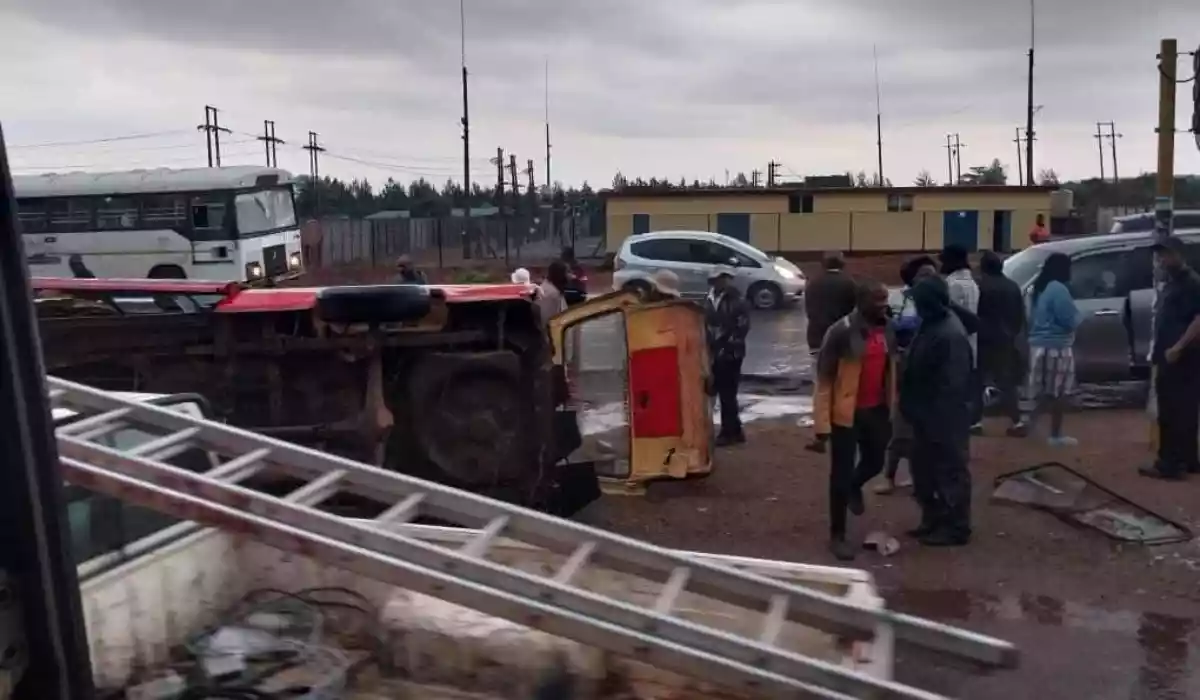
THE sirens wail on Harare’s streets with alarming frequency these days.
Another kombi accident, another family torn apart, another testament to the mounting crisis on Zimbabwe’s roads.
As the nation hurtles towards the festive season, the streets of major cities have become theatres of tragedy, where commuter omnibus drivers perform their deadly dance of speed and recklessness, leaving trails of devastation in their wake.
The recent Kuwadzana catastrophe, where seven lives were brutally snuffed out when a kombi collided with a fuel tanker, is not merely another statistic.
It represents the culmination of a systemic failure that has plagued Zimbabwe’s transport sector for years.
The accident, occurring at the traffic-controlled intersection of First Street and Bulawayo Road, demonstrates the lethal combination of hurry and hubris that characterises our public transport system.
The culture of impunity among kombi crews has reached alarming proportions.
In Harare, Bulawayo, Mutare and other major cities, these modern-day cowboys create virtual highways within highways, transforming two-lane roads into three or four-lane death traps.
- Mavhunga puts DeMbare into Chibuku quarterfinals
- Bulls to charge into Zimbabwe gold stocks
- Ndiraya concerned as goals dry up
- Letters: How solar power is transforming African farms
Keep Reading
Their battle cry tirikutsvaga mari (we are looking for money) has become a macabre motto that prioritises profit over human life.
When passengers dare to protest these dangerous practices, they are often met with contempt and the infamous retort: “If you are afraid, just disembark.”
The statistics from the Traffic Safety Council of Zimbabwe (TSCZ) paint a horrifying picture of this crisis.
The loss of over 2 000 lives in 2023 alone, coupled with 9 955 injuries, represents not just numbers, but shattered dreams and ruined families.
Each death ripples through communities, creating waves of economic and social devastation that span generations.
The socio-economic implications of these accidents are devastating in Zimbabwe’s already fragile economy.
When breadwinners perish in these senseless accidents, they leave behind families which face not just emotional trauma but severe economic hardship.
Children drop out of school unable to afford fees.
Families lose their homes because they cannot maintain mortgage payments.
The elderly lose their support systems.
The tragic testimony of a widow raising three children alone after losing her husband on the Harare-Masvingo Highway echoes thousands of similar stories across the nation: “It is difficult to explain the emptiness that comes when your loved one is taken from you in such a manner.”
The festive season traditionally amplifies this crisis.
As December approaches, kombi crews become increasingly reckless in their pursuit of maximum trips that culminate in profits.
The roads transform into racecourses where every red light becomes optional, every gap between vehicles becomes an invitation to overtake and every passenger becomes an unwitting participant in a deadly gamble.
Lucy Kuwandira from TSCZ points to human error as the primary culprit, citing “speeding, drinking and driving, overloading and through all sorts of ills that we see people doing on our roads”.
However, this simplistic attribution masks the deeper systemic issues plaguing our transport sector.
Government’s recent announcement of surveillance camera installation at traffic intersections marks a step forward, but much more comprehensive action is required.
The planned system linking vehicle data to personal information and bank accounts for automatic fine deduction could serve as a deterrent, but only if implemented effectively and transparently.
Transport and Infrastructural Development minister Felix Mhona”s promise of “robust legal, policy and administrative mechanisms” must translate to concrete action.
This should include mandatory defensive driving courses for public transport operators, regular vehicle inspections and strict enforcement of working hours for drivers.
The ministry must also address the root cause of this crisis, which is the economic pressures that drive operators to maximise trips at the expense of safety.
The Zimbabwe Republic Police needs to revolutionise its approach to traffic enforcement.
National police spokesperson Commissioner Paul Nyathi’s call for transport operators to “rein in their drivers” must be backed by consistent, visible policing and severe consequences for violations.
The practice of spot fines, while convenient, has proven insufficient as a deterrent.
Engineer Cosmas Mashanda’s advocacy for strengthening laws and implementing technological solutions deserves immediate attention.
Beyond cameras and fines, the government should consider implementing a points-based licensing system that permanently removes repeat offenders from our roads.
The public transport sector requires complete overhaul.
The success of regulated transport systems like Zupco shows that safer alternatives are possible.
However, these must be expanded and made more efficient to reduce reliance on informal operators.
Passenger associations must become more vocal and organised in their advocacy for safe transport.
Establishing reporting systems for dangerous driving, organising boycotts of notorious operators and pushing for legislative changes could help drive reform from the ground up.
As we approach another festive season, the words of accident survivors and bereaved families should echo in our national consciousness.
Every skid mark on our roads, every crumpled vehicle, every tear shed at a funeral represents failure by society to protect its citizens.
The time for half-baked measures and empty rhetoric has passed.
Zimbabwe needs decisive action to end this deadly pursuit of profit that has turned our roads into killing fields.
The solution lies in a co-ordinated effort involving all stakeholders from government officials to individual passengers.
Until we treat this crisis with the urgency it deserves, our roads will continue to claim lives, our families will continue to be torn apart and our nation will continue to bear the crushing weight of preventable tragedy.










